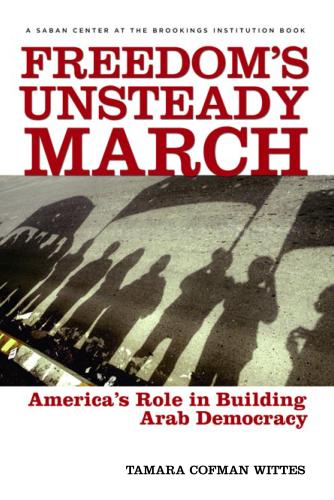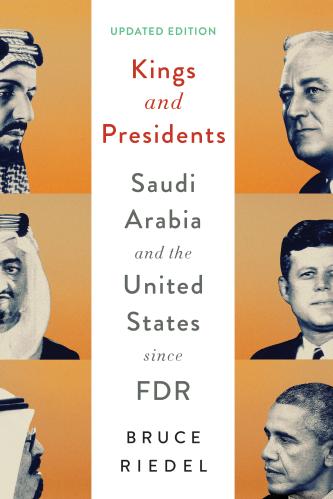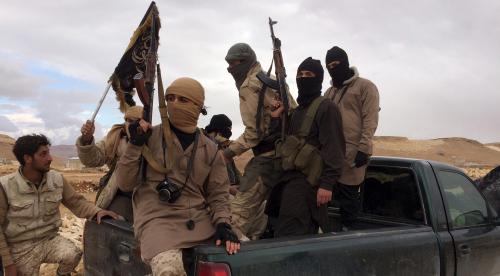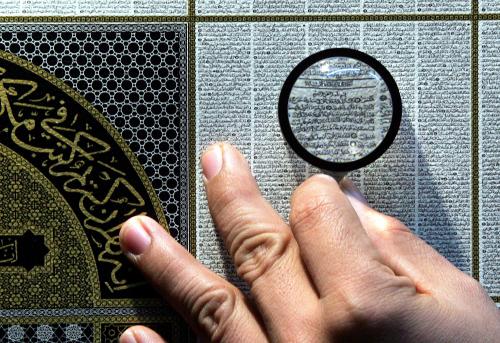Regime type matters. If regimes do not share our values, then it is difficult for them to be aligned with American interests over time, since values and interests are not, and should never be treated as, entirely separate, argues Shadi Hamid. A version of this originally appeared in The American Interest.
U.S. efforts to promote democracy in the Middle East have long been paralyzed by a unique “Islamist dilemma”: We want democracy in theory but fear its outcomes in practice. In this case, the outcomes that we fear are Islamist parties either doing well in elections or winning them outright. If we would like to (finally) get serious about democratic reform in the region, then we have to resolve this dilemma one way or the other.
The simple fact is that there is no way to both support democracy in the Middle East and oppose the participation of Islamist parties. If Islamist parties — most of which are nonviolent, accept the nation-state, and participate in the parliamentary process if allowed — are among the largest in their respective countries, then a democracy that excludes them is no democracy at all. A policy that views all Islamists as the problem can only end up justifying permanent autocracy. And there is nothing new about such an approach: America has consistently, albeit with varying degrees of enthusiasm, stood by “pro-American” authoritarian allies. And as New York Times correspondent David Kirkpatrick documents in a recent book, even the supposedly Islamist-friendly Obama administration gave the Egyptian army what amounted to a wink ahead of the 2013 military coup against a democratically elected Islamist government.
Are we, as Americans, comfortable with consigning hundreds of millions of Arabs and Muslims to such a fate in the guise of anti-Islamism, which is essentially another way of saying they can’t be trusted to vote correctly? This is a moral question, but it is also a question of what’s in America’s long-term interests.
In a recent essay for The American Interest titled “How Should America Deal with Authoritarian States?,” Svante Cornell is admirably forthright about his premises. One such premise, drawing on Jeane Kirkpatrick’s classic if controversial essay, is that there is a fundamental difference between authoritarian and totalitarian states. But Cornell mistakes President Abdel Fattah al-Sisi’s regime for the former rather than the latter. Kirkpatrick characterized traditional autocracies as those that “do not disturb the habitual rhythms of work and leisure, habitual places of residence, habitual patterns of family and personal relations.” The Sisi regime and it supporters, however, do all these things, including encouraging citizens to inform on one another.
Totalitarian regimes, writes Cornell, are “murderous and predatory,” and indeed the Egyptian regime is unusually “murderous” even by autocratic standards; under Sisi, Egypt experienced one of the worst single-day massacres of the past century, with more than 1,000 killed. Cornell argues that Sisi has protected the Coptic minority. He hasn’t, as National Review’s Marlo Safi explains in considerable detail. Nor has Sisi embarked on religious reform or been the foe of extremism that he claims to be.
Sisi, in fact, has relied on the country’s clerical class to justify in explicitly religious terms the killing of protesters in a way his Islamist predecessor, the Muslim Brotherhood’s Mohamed Morsi, could have never dreamed of. As former Grand Mufti Ali Gomaa put it, speaking after the aforementioned Rabaa massacre, “When someone tries to divide you, then kill them. . . . Blessed are those who kill them. . . . We must cleanse our Egypt of this trash.” That Gomaa and other pro-regime clerics would employ the kind of takfirist reasoning associated with ISIS — arguing that Morsi supporters were akin to heretics and therefore their blood was licit — belies Sisi’s self-styled portrayal as a beacon of “moderation.”
Cornell also cites the United Arab Emirates as one of the more promising Arab countries, in part because it is more secular. Yet this isn’t quite correct. What the UAE embodies is not “political Islam” in the traditional sense, but it is certainly a politicized Islam. As the leading American scholar of the Gulf, Gregory Gause, describes it, the UAE “represents a third trend in political Islam. Official Islam in the Emirates is tightly tied to state authority and subservient to it.” In short, seemingly liberal Arab regimes offer the false promise that repression can be wielded in the service of liberalism. But because politics and religion are inevitably intertwined in Muslim-majority countries, it is impossible to have religious freedom in the absence of political freedom. An authoritarian state will only be willing to allow religious expression that does not threaten the state. This should never be confused with “religious freedom” or “religious pluralism.”
What about authoritarian allies’ conduct abroad? Even the more “liberal” authoritarian states are “predatory” beyond their own borders. Take the UAE’s destructive role (along with Saudi Arabia) in the ongoing Yemen war, or that regime’s dogged support for a would-be dictator, Khalifa Heftar, in Libya. Or consider the fact that the UAE worked to undermine Washington’s (halfhearted) efforts to mediate between Sisi and the Muslim Brotherhood in an attempt to forestall an outbreak of violence after the Egyptian coup.
The notion that “pro-American” autocrats can be counted on to further American interests has been a mainstay of bipartisan foreign policy thinking, even though it’s been contradicted by actual events time and time again. Even the most casual observer can see that our reliance on authoritarian allies has not led to a more peaceful, stable region—if anything, the opposite is true. Authoritarian regimes are only good at providing an illusion of stability, and even then the illusion is a decidedly of a short-term nature.
Regime type matters. If regimes do not share our values, then it is difficult for them to be aligned with American interests over time, since values and interests are not, and should never be treated as, entirely separate. In other words, if liberal authoritarians are the answer to the question, then there is no answer. This doesn’t mean that U.S. policymakers should support Islamist parties, but it does mean that they should avoid taking sides in other countries’ electoral contests or buying into regimes’ self-serving claims that even nonviolent Islamist parties must be excluded by any means necessary. The maxim of “one man, one vote, one time”— that Islamist parties will cancel democracy after being elected to power—has never actually happened. (The one arguable exception is Hamas’s rise to power in 2016, but even that isn’t a clear-cut case, as Khaled Elgindy has argued).
If Americans believe in democracy at home, we should ask ourselves why. Some of those reasons are “procedural:” Democracy allows for peaceful transfer of power, particularly in ideologically polarized contexts; democracy regulates conflict and therefore contributes to peace and stability; democracy offers predictability, since losers of elections have the chance to fight, peacefully, another day. Such “minimalist” objectives of regulating conflict are even more important in a region like the Middle East defined by increasing levels of civil conflict.
Does this mean we should pay more attention to the faults of our autocratic allies then to adversaries like Iran or Venezuela? No. We should take both seriously. The reason, however, that many democracy promotion advocates focus on the former is one of practicality. Because they are our allies, and because they depend on the United States for security as well as economic and military support, we have more leverage over their behavior. And if we can use that leverage not in the naïve wish that they become democracies overnight but that they at least become less repressive, then we should, because we can. Doing so isn’t “just” in line with our ideals; it is also, ultimately, in our interests.









Commentary
The false promise of ‘pro-American’ autocrats
March 19, 2020